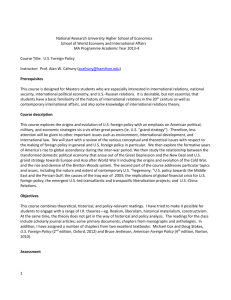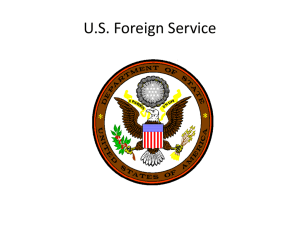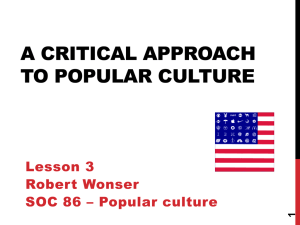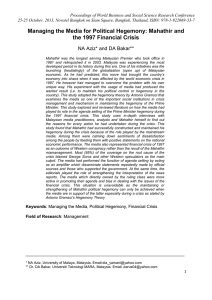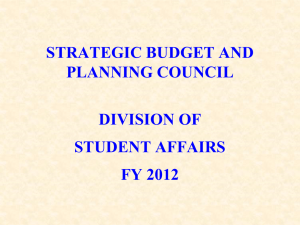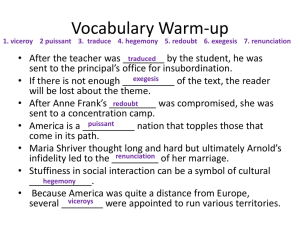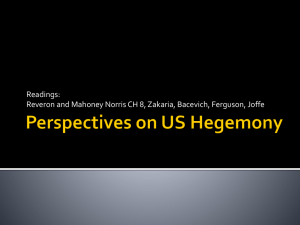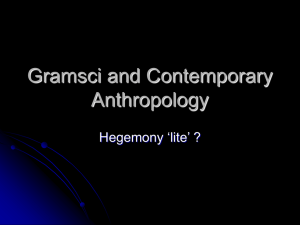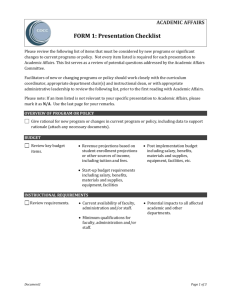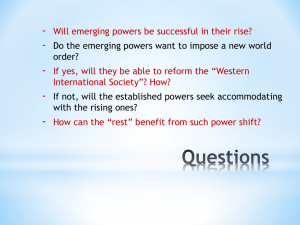Programme
advertisement
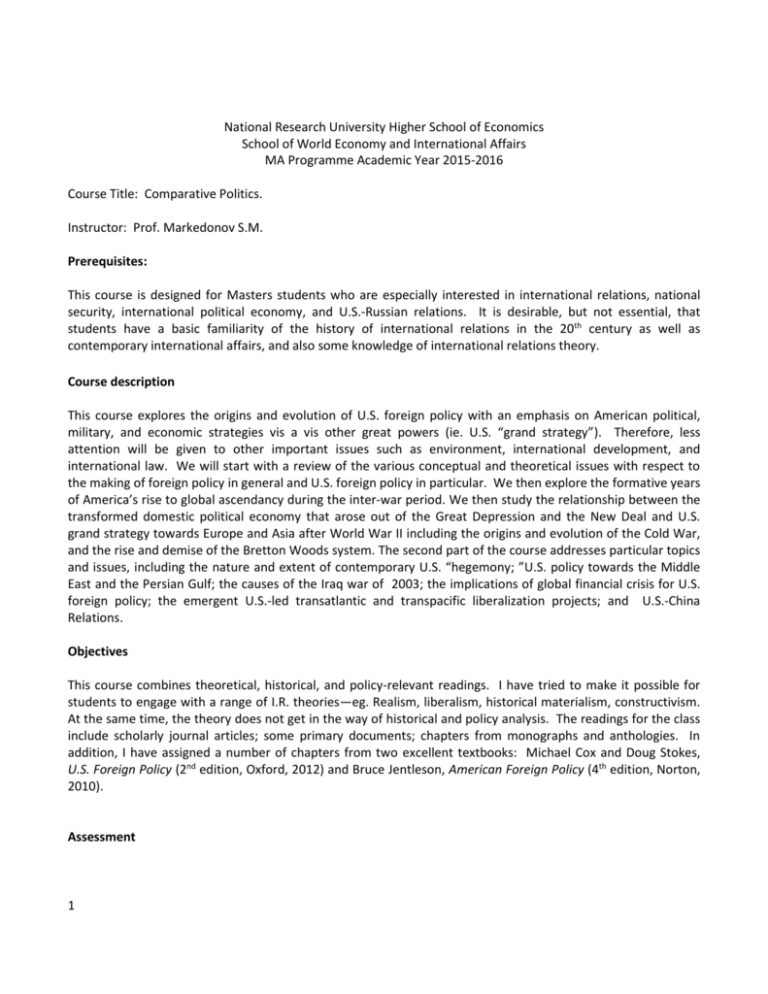
National Research University Higher School of Economics School of World Economy and International Affairs MA Programme Academic Year 2015-2016 Course Title: Comparative Politics. Instructor: Prof. Markedonov S.M. Prerequisites: This course is designed for Masters students who are especially interested in international relations, national security, international political economy, and U.S.-Russian relations. It is desirable, but not essential, that students have a basic familiarity of the history of international relations in the 20th century as well as contemporary international affairs, and also some knowledge of international relations theory. Course description This course explores the origins and evolution of U.S. foreign policy with an emphasis on American political, military, and economic strategies vis a vis other great powers (ie. U.S. “grand strategy”). Therefore, less attention will be given to other important issues such as environment, international development, and international law. We will start with a review of the various conceptual and theoretical issues with respect to the making of foreign policy in general and U.S. foreign policy in particular. We then explore the formative years of America’s rise to global ascendancy during the inter-war period. We then study the relationship between the transformed domestic political economy that arose out of the Great Depression and the New Deal and U.S. grand strategy towards Europe and Asia after World War II including the origins and evolution of the Cold War, and the rise and demise of the Bretton Woods system. The second part of the course addresses particular topics and issues, including the nature and extent of contemporary U.S. “hegemony; ”U.S. policy towards the Middle East and the Persian Gulf; the causes of the Iraq war of 2003; the implications of global financial crisis for U.S. foreign policy; the emergent U.S.-led transatlantic and transpacific liberalization projects; and U.S.-China Relations. Objectives This course combines theoretical, historical, and policy-relevant readings. I have tried to make it possible for students to engage with a range of I.R. theories—eg. Realism, liberalism, historical materialism, constructivism. At the same time, the theory does not get in the way of historical and policy analysis. The readings for the class include scholarly journal articles; some primary documents; chapters from monographs and anthologies. In addition, I have assigned a number of chapters from two excellent textbooks: Michael Cox and Doug Stokes, U.S. Foreign Policy (2nd edition, Oxford, 2012) and Bruce Jentleson, American Foreign Policy (4th edition, Norton, 2010). Assessment 1 This course will combine lectures, class discussions, and student presentation. The first period will generally consist of a lecture; the second period will involve a focused discussion of key problems and issues that arise out of the readings and lectures. The final grade will be based on the following: Attendance and participation: 20% 6-8 page essay 40% Final exam 40% Topic I General Considerations Assigned Readings: Brian Schmidt, “Theories of U.S. Foreign Policy” Daniel Deudney and Jeffrey Meiser, “American Exceptionalism” Bruce Jentleson, American Foreign Policy: The Domestic Content,”, pp. 27-71 Robert Hunter Wade, “The Invisible Hand of the American Empire” Piers Robinson, “Media and US foreign Policy” Is the concept of ‘exceptionalism valid?” Is U.S. foreign policy “unique” because of America’s specific political culture or constitution? What role do the media play in U.S. foreign policy? What does Wade mean by the “invisible” empire? Does it still exist in 2013? Topic 2 The Rise to Global Power Walter Lafeber, “The US Rise to World Power, 1776-1945” Leo Panitch and Sam Gindin, The Making of Global Capitalism: The Political Economy of American Empire pp, 2566. Henry Kissinger, “Isolationism vs. Internationalism: FDR and the Coming of World War II” Why did the United States fail to join the League of Nations? Why did Wilson fail to”make the world safe for democracy?” How did the domestic economy and political alignment after World War I shape American foreign policy? Why did FDR pursue an isolationist foreign policy until 1939? Why did Japan attack the United States at Pearl Harbor? In what sense did the Cold War develop immediately after World War I? Topic 3 The Construction of U.S. Hegemony After World War II: Geopolitics and the Cold War Bruce Jentleson, American Foreign Policy, pp. 114-149 William Appleman Williams, “The Nightmare of Depression and the Vision of Omnipotence” Arthur Schlessinger, “Origins of the Cold War” 2 Peter Gowan, “US-UN” Gabriel Kolko, The Politics of War, pp. 13-30; 343-369; 457-483. Was the Cold War “inevitable”? Compare and contrast the arguments of Williams and Schlessinger. What role did the personalities of Stalin, Roosevelt, and Truman play in the origins of the Cold War? What were U.S. and Soviet objectives in relation to the United Nations? Topic 4 From Détente to the End of the Cold War Jentleson, pp. 150-196 John Lewis Gaddis, “The End of the Cold War: The Unexpected Ronald Reagan Mikhail Gorbachev, “The End of the Cold War: The Soviet Union’s Crucial Role John Tirman, “How We Ended the Cold War” Beth Fascher, “Military Power and US Foreign Policy” Rick Saul, “American Foreign Policy During the Cold War” In what ways did domestic developments influence American foreign policy during the Cold War? Does the end of the Cold War support orthodox or revisionist interpretations? Why did the United States intervene in Viet Nam? Topic 5 The Construction of U.S. Hegemony After World War II: Rise and Fall of Bretton Woods Peter Gowan and Doug Stokes, “Global Economy” Leo Panitch and Sam Gindin, 66-132 Yanis Varoufakis, The Global Minotaur, 57-168 Simon Johnson, “The Quiet Coup” Matt Taibbi, “Wall Street’s Bailout Hustle” Satjatjit Gas, “The End of Growth?” How is the concept of “hegemony” useful in explaining the construction of the Bretton Woods system? How and why did the Bretton Woods system break down? During the late 1980s many observers believed that Japan would replace the United States as #1? What happened? In what ways did American military power help to reinforce American economic power? Have U.S. current account deficits been beneficial or harmful to the world economy? To the United States? Is the concept of a “Wall Street Treasury Complex” helpful in understanding U.S. foreign economic policy? Topic 6 The United States in the Middle East I. Causes of War in Iraq Jentleson, 405-434. Toby Dodge, “US Foreign Policy in the Middle East” 3 Alan Cafruny and Timothy Lehmann, “Over the Horizon” New Left Review Alan Cafruny and Timothy Lehmann, “Historical Materialism, Hegemony, and Imperialist Rivalry” Karen Ruth Adams, “Structural Realism: The Imperialism of Great Power” Jeffrey W. Taliaferro and Robert W. Wishart, “Neoclassical Realism: Domestic Opportunities for Great Power Intervention” Sean Kay, “Neoliberalism: Managing Collective Problems” Jennifer Sterling Folker, “Constructivism” Jennifer Sterling Folker, “Historical Materialism and World System Theory” John Mearsheimer and Stephen Walt, “The Israel Lobby” London Review of Books, 28, 6 (March, 2006). Project for the New American Century, “Statement of Principles” and “Letter to President Clinton” Was the Iraq War “inevitable?” Scholars have proposed a variety of different explanations for the U.S. attack on Iraq in 2003. Which explanations do you find most/least compelling and why? Why did France, Russia, and Germany oppose the war? What was the basis of their opposition? What is the “Israeli lobby?” What role does it play in U.S. foreign policy? Topic 7 The United States in the Middle East II. Iran and Afghanistan Stephen Kinzer, Overthrow: America’s Century of Regime Change from Hawaii to Iraq, chapter 5: Despotism and Godless Terrorism Stephen Biddle, “Ending the War in Afghanistan” Foreign Affairs, 92,5 (September-October, 2013) Karl Eikenberry, “The Limits of Counterinsurgency Doctrine in Afghanistan” Foreign Affairs, 92,5 (SeptemberOctober 2013) Robert Jervis, “Getting to Yes With Iran” Foreign Affairs 92,1 (Jan.-Feb. 2013) Akbar Ganji, “Who is Ali Khameini?” Foreign Affairs 92,5 (Sept.-October 2013). How has the history of U.S. foreign policy in the Middle East and Persian Gulf influenced Iranian perceptions of the United States? Could the United States live with a nuclear Iran? What policies should the United States pursue towards the new government in Iran? What, if anything, has the United States accomplished in Afghanistan? When and how should it depart? Topic 8 United States and Europe Mike Smith, “The USA and the EU” Peter Rutland and Gregory Dubinsky, “US Foreign Policy in Russia Alan Cafruny, “The Geopolitics of US Hegemony in Europe: From the Break-Up of Yugoslavia to the War in Iraq” Alan Cafruny, “The Eurozone Crisis and German Foreign Policy” Varoufakis, 169-185 During the 1990s and early 2000s it was widely argued that the EU was emerging as a superpower, and even a rival to the United States? What were the problems with this argument? What are the nature and limits of U.S.-Russian conflict? 4 Is there a revived “German question?” Is Germany likely to pursue a new “Rapallo” strategy or remain commited to Atlanticism? What was the significance of the wars in Bosnia and Kosovo for U.S. policy in Europe? Topic 9 United States and Asia Michael Cox, “The USA, China, and Rising Asia” Hung Ho Fung, “America’s Head Servant” New Left Review Niall Ferguson, “What Chimerica Hath Wrought” Martin Hart-Landsberg, “The US Economy and China” Herman Schwartz, “China and the United States in the Battle for Jobs and Growth” Kevin Rudd, “Beyond the Pivot” Foreign Affairs 92,2 (March-April 2013) Timothy Lehmann, “Oil and the Sino-American Rivalry” Why do China’s leaders become concerned when they study Japan’s experience during the 1980s and 1990s? What are the strengths and weaknesses of China’s economy in relation to the United States? How and why is the United States pursuing a “balancing” strategy in Asia? Topic 10 The United States and the ‘Arab Spring’ Caroline Kennedy-Pike, “American Foreign Policy After 9/11” Paul Rogers, “Global Terrorism” Charles Krauthammer, “Uniliateralism: The Unipolar Moment Revisited” Michael Mandelbaum, “America as the World’s Government” George Bush, “Preemption and National Security Strategy” Joseph S. Nye, “Obama and Smart Power” Jason Brownlie, Democracy Prevention: The Politics of the U.S.-Egyptian Alliance, pp. 1-14; 123-177. Readings on Syria to be announced Discuss critically the concept of “humanitarian intervention.” Do great powers ever act on humanitarian grounds? Discuss the experience with UN Resolution 1973 regarding Libya. What have been the key criteria informing U.S. policy towards the “Arab spring?” Discuss the evolution of U.S.-Egyptian relations. Why did the United States support the formation of a Muslim Brotherhood government under Morsi? What are the economic means by which the United States influences Egyptian politics and policies? Topic 11 Political Economy of the “West” vs. China? Jentleson, “The Globalization Agenda” pp. 528-550 BertelsmanStiftung (2013) Transatlantic Trade and Investment Partnership: Who Benefits from a Free Trade Deal? Congressional Research Service, Report for Congress: The Transpacific Partnership Agreement (2011) Robert E. Scott, “No Jobs from Trade Pacts: The TPP Could be Much Worse than the Overhyped Korea Deal” Economic Policy Institute, 2013 5 Center for Economic Policy Research, “Gains from Trade? The Net Effect of the TPP on U.S. Wages” Center for Economic and Policy Research” 2013. Richard Rosecrance, The Resurgence of the West: How a Transatlantic Union Can Prevent War and Restore the United States and Europe, New Haven: Yale University Press, pp. to be announced. What are the implications of the TTIP for Europe? For the United States? What are the implications of the TPA for the United States? For China? Does the failure of the Doha Round and the turn to TTIP and TPA represent a defeat for the principle of multilateralism? What are the implications of these pacts for American workers? Topic 12 US Foreign Policy in the Future Anatol Lieven “The Future of US Foreign Policy” Christopher Layne, William Wohlforth, and Stephen Brooks, “US Decline or Primacy” Jacob Hacker and Paul Pierson, Winner Take All Politics, pp. 11-40 J. Bradford DeLong, “The Second Great Depression” Foreign Affairs 92,4 (July-August, 2013) Michael Levi, “America’s Energy Opportunity” Foreign Affairs, 92,3 (May-June 2013) Observers have anticipated the decline of American hegemony for the past 40 years. In what sense is U.S. hegemony in decline? In what sense is U.S. hegemony deepening? Who are the likely challengers to American power over the next generation? What are the implications of growing American poverty and inequality for U.S. foreign policy? What are the implications of loss of manufacturing and the power of Wall Street for American power? What, if anything, does “smart power” mean? 6
